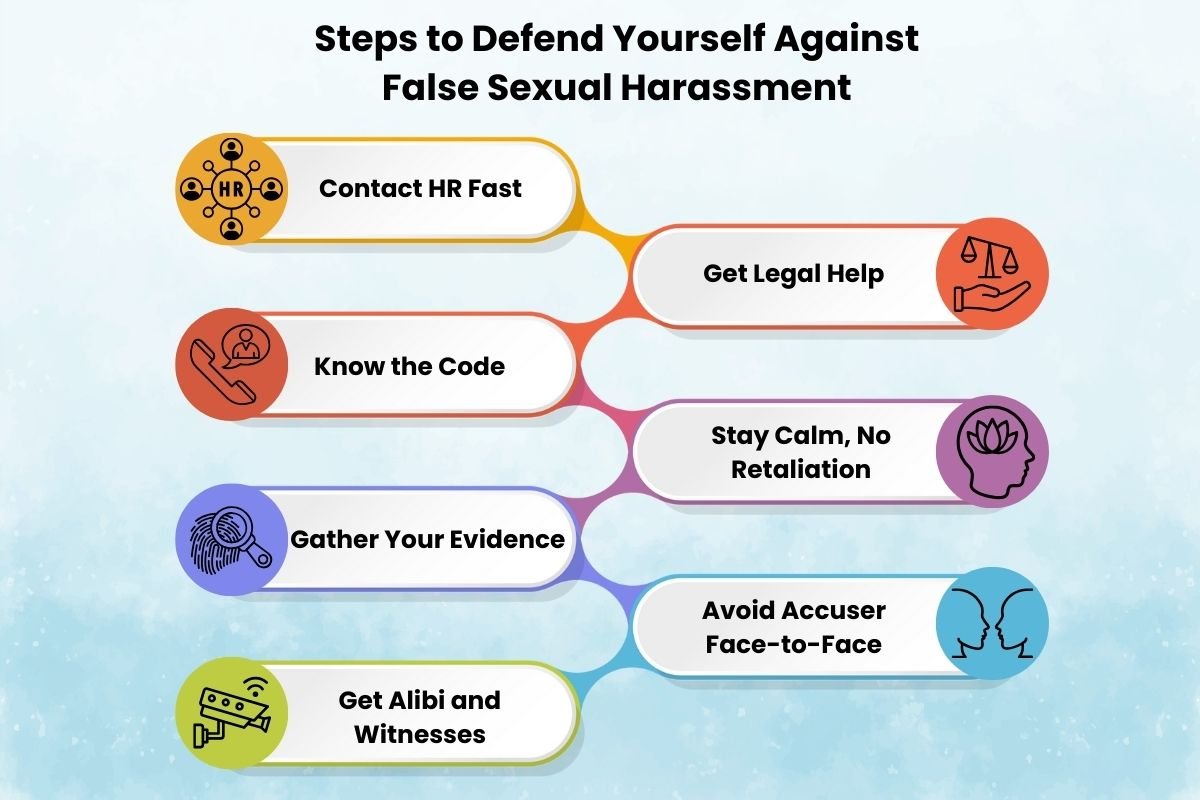Have you ever been accused of something you had absolutely nothing to do with? It’s a gut-punching mix of shock, confusion, and frustration, kind of like opening a pizza box, expecting extra cheese, and instead seeing pineapple chunks staring back at you when you never ordered pineapple. Now, imagine that feeling multiplied by a hundred when the accusation is something as serious as sexual harassment.
Sexual Harassment claims don’t just sting; they stick. They can smear your reputation, strain your relationships, and make your professional life feel like it’s under a microscope. The worst part? You might have no idea why the accusation happened in the first place. Maybe it’s a misunderstanding, maybe a personal grudge, or maybe someone just decided to play dirty.
But here’s the thing, you’re not powerless. You can cut through the noise, separate truth from fiction, and defend your name with clarity and confidence. And yes, we’ll keep a dash of humor in the mix, because staying calm and collected is part of winning the fight. This isn’t about panic, it’s about strategy. This guide will walk you through understanding false sexual harassment, spotting the red flags, and taking the right steps so you can stand tall, protect your reputation, and keep moving forward stronger than before.
What Is False Sexual Harassment?

Sexual harassment is when a person is accused of unwanted sexual behavior, but the incident either never happened or is misrepresented. It can stem from misunderstandings, personal grudges, or intentional lies. In 2025, workplace studies estimate that roughly 2-8% of reported cases are false, though the rate changes based on country laws, workplace culture, and how reports are investigated. This makes it a serious issue because it damages reputations, careers, and trust while also undermining genuine harassment cases.
Why False Sexual Harassment Happens
- Personal conflict: A breakup or job rivalry can trigger a wrong claim.
- Misunderstanding: A joke gone wrong turns serious.
- Attention or gain: Some people want power, sympathy, or legal leverage.
In each case, naming it right and naming it false sexual harassment helps put steps into motion.
Steps to Defend Yourself Against False Sexual Harassment

1. Contact HR Fast
The first step when facing false sexual harassment is to report the situation to your company’s HR department as soon as possible. HR is trained to handle sensitive issues and will begin an official investigation.
When you speak to them:
- Keep your tone calm and steady.
- Share the facts without adding unnecessary emotions.
- Clearly state that you believe the accusation is false and you want a fair process.
- Ask for details on the investigation process so you know what to expect.
Acting quickly shows you take the matter seriously and have nothing to hide. It also ensures your side of the story is heard from the beginning.
2. Know the Code
Every workplace has its harassment policy. Read it carefully. Compare your actions to what the policy says counts as harassment. Sometimes, what you see as a harmless gesture or joke may be taken differently by someone else.
By understanding the rules:
- You can see if there was a misunderstanding.
- You can show HR that your behavior didn’t meet the company’s definition of harassment.
- You can spot if the accusation really is false sexual harassment.
- Having this knowledge gives you a strong base for your defense.
3. Gather Your Evidence
Facts win over feelings in these cases. Start writing down your version of what happened, including time, date, location, and any other important details. Do it while events are fresh in your mind.
Evidence can include:
- Emails or text messages that show a normal conversation.
- Calendar entries proving you were busy elsewhere.
- Screenshots of relevant messages.
Even small details can prove that the claim is false sexual harassment.
4. Get Alibi and Witnesses

If you were not in the place where the incident supposedly happened, prove it. This is where an alibi comes in.
Useful proof can be:
- Parking or toll receipts.
- CCTV footage from your office or building.
- Digital check-ins, like meeting logs.
Also, ask any witnesses who were with you to give a written statement. A clear alibi can make a false sexual harassment claim collapse fast.
5. Get Legal Help
If things start to move beyond HR, like into formal complaints, lawsuits, or police involvement, hire a lawyer who specializes in harassment defense.
When choosing an attorney:
- Check their experience with similar cases.
- Ask for examples of past results.
- Make sure they communicate clearly and keep you informed.
A skilled lawyer can protect your rights, guide you on what to say or not say, and help you avoid mistakes that could make the false claim look true.
6. Stay Calm, No Retaliation
It’s natural to feel angry or betrayed when accused of something you didn’t do. But losing your temper will only hurt your case.
Avoid:
- Arguing with the accuser.
- Posting about the case online.
- Making threats or sarcastic comments.
Any sign of aggression could be used as “proof” against you. Staying professional shows that you are serious and confident in clearing your name from false sexual harassment.
7. Avoid Accuser Face-to-Face

Direct conversations with the accuser are risky. Even a casual chat could be twisted into something it wasn’t.
Instead:
- Keep all communication formal and documented.
- Go through HR or your lawyer.
- Avoid private spaces where it’s just you and them.
This protects you from more misunderstandings or further sexual harassment claims.
Signs That You Might Be Facing False Sexual Harassment
- Alleged behavior never happened.
- Accuser offers vague, shifting details.
- There’s no record of email, text, or video to support the claim.
- You were elsewhere; witnesses or logs prove it.
These all point to potential false sexual harassment, and they matter.
Example Scenario (Simple & Realistic)
Imagine a co-worker claims you touched their shoulder inappropriately. You remember just guiding them past a low shelf. You take these steps:
- Note the date and location.
- Ask HR to review CCTV.
- Speak to a friend who was nearby.
- Realize the claim feels like false sexual harassment.
With calm proof, HR clears you and suggests better hallway etiquette.
Prevention Tips to Avoid Becoming Involved in False Sexual Harassment Situations
- Keep actions simple and clear.
- Use polite, professional language.
- Don’t touch unless you have clear permission.
- Document sensitive interactions.
These small acts help steer away from any accusation space, even false sexual harassment claims.
- Recommended by Our Editors: Recognizing and Reporting Sexual Harassment at Office Holiday Events
Conclusion:
False sexual harassment can feel like a storm you didn’t see coming, rumors swirl, trust wavers, and suddenly, you’re defending your name against something you never did. It’s frustrating and unfair, but you’re far from powerless. You can steady yourself, gather proof, and take smart steps to show the truth. Think of it like pineapple on pizza: some people love it, others hate it, but in this case, it doesn’t belong on your plate at all.
By staying calm, following company procedures, involving HR, and getting legal support when needed, you turn chaos into order. The goal isn’t just to win a case; it’s to protect your integrity, your career, and your peace of mind. Whether you’re clearing a false claim or preventing one from starting, remember, fairness, firmness, and confidence are your strongest allies. In the end, truth has a way of speaking for itself, especially when you help it along with facts and level-headed action.


















